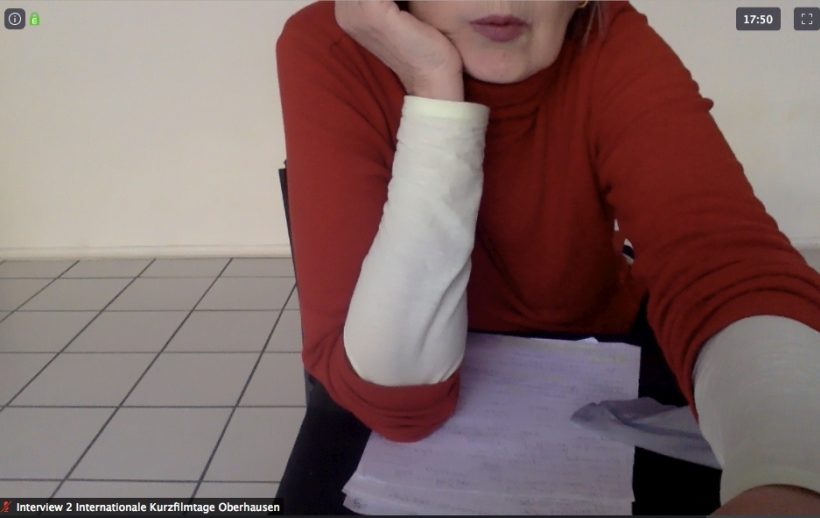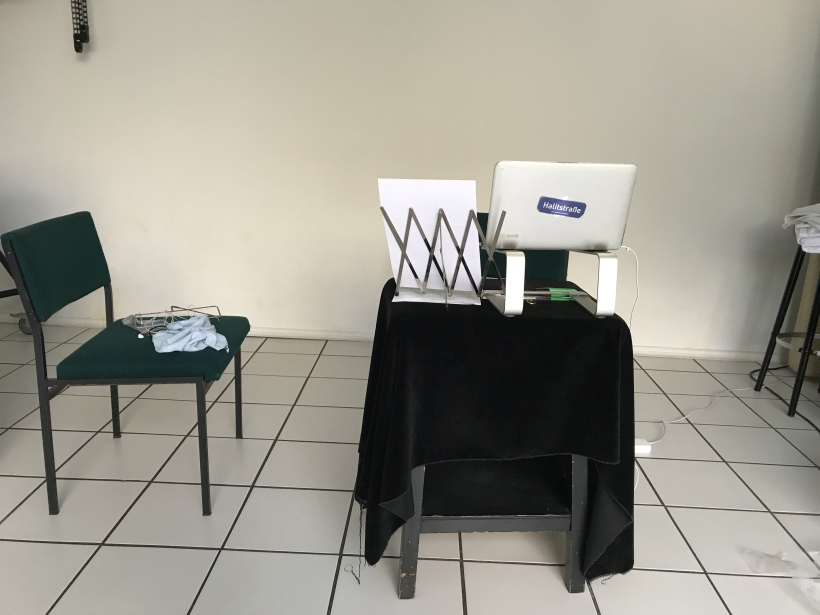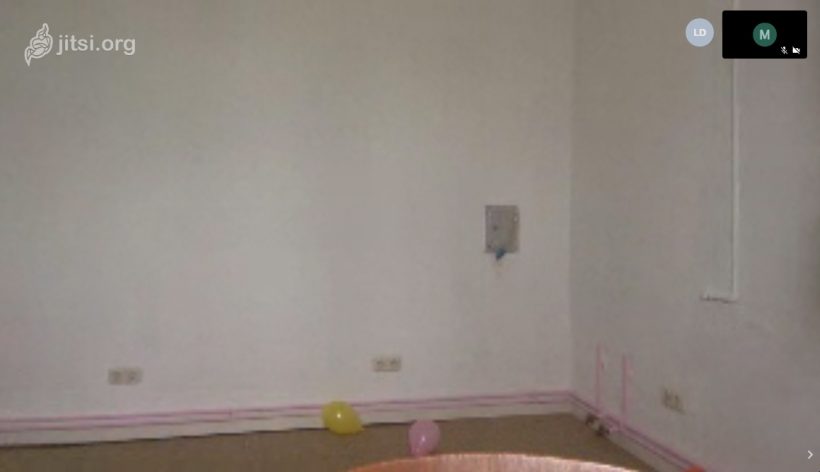
© Madeleine Bernstorff
As a commission member of the International Short Film Festival Oberhausen, I faced a new challenge with the Covid19 lockdown and the decision to hold the festival online and record conversations with the filmmakers for that purpose.
Film talks and discussions have a long history in Oberhausen. Ranging from the so-called fail-safe educational “discussions” by the not entirely exonerated old men in the 1950s, the heated debates in which the contentists and the formalists attacked each other, to today’s “workshop talks” with the filmmakers joining a small group of interested members of the audience after their screening, with the talks being moderated by two members of the selection commission. These can be an agony or a joy for the filmmakers, depending on the circumstances, and occasionally even both. For some of them, it is the first time ever that they speak in detail and publicly about their work. Several others nervously wait until it is their turn based on the sequence of the screenings. Then they gradually give up fashioning and marketing their self-presentation billboard as an artist, beginning ideally with open exchanges among each other, then often even speaking more fundamentally and movingly about their work than the by-now usually short Q&As permit. For the festival experience, however, the informal talks that result in the biotope of a rather non-hierarchical small festival are also decisive.
Video Chats Rather than Film Talks
Now to this year, when we were catapulted into this online version: we did have a bit more time than other festivals, but still far too little. The plan was to have short pre-produced video interviews that would be seen (or skipped) after the films in the same sequence as the individual programmes. The production requirements: Five minutes for these somersaults in digital space. After several protests from the commission members, we did at least get a maximum ten minutes of interviewing time. (Understandably, several filmmakers whose five-minute talks were recorded at the beginning felt unfairly treated.) Transforming such live talks directly at a festival into an appropriate online format was both a task and an opportunity. It permitted and called for the creation of trust, as well as the conducting of in-depth research and the preparation of the questions.
One filmmaker described it as follows:
I feel it’s an open door to dig deeper into a director’s work. You can take your time and do research after watching a film, getting to know their previous works, etc.
My understanding of this task also included “shooting” the takes several times if required, as it was essential for me that the filmmakers were in agreement with their image in the public sphere. For that, there was also the understandable occasional unease with the online coverage in surveillance-camera mode. So the idea was to at least thematise this with these dialogues being conserved, even if the unease was not entirely dispersed. We recorded using tools we also had to first develop to some extent. The most diverse of discursive characters and speaking paces had to be moderated, and consideration given to one’s own questioning techniques and even to the tricky self-presentations occasionally.

© Madeleine Bernstorff
For me, however, during this rigid lockdown period, it meant that at least I would also experience a unique selective togetherness with the 23 filmmakers I was responsible for. And get to test the benefits of the format. For example during her interview from her workbench at home, one filmmaker presented her special macro lens, with which she had shot her Bolex 16 mm film. One female commission colleague developed new formats from the conference tools together with the filmmakers: A talk on a roof or with an analogue old-school telephone. In one video, she thwarted the supposed online togetherness in the talk with the female filmmaker by deliberately displacing it temporally and retroactively assembling its dialogue. Another female colleague even asked the filmmakers to give a “direct” message to the online audience at the end of their talks. Many of the filmmakers appreciated our video talks:
Personally, I liked the interview format which was there as an option, and I’ve not seen many other festivals do that so far. It added a face, a human being behind the film, which is always so precious when one attends a festival in person and is present for the Q&A.
one female filmmaker wrote.
After the festival, I thanked the filmmakers in my video interviews and asked them for feedback, for criticism, for their personal online festival experiences. Hereunder, I would like to quote from these and further replies in the conversations with the filmmakers.
Feedback and Compliments
Everyone praised the festival team’s efforts and hard work:
The support and guidance was personal, intensive and professional, and we felt we were in very good hands! … Even if we would, of course, loved to have seen the film in the Oberhausen Lichtburg cinema on a massive screen, but considering the situation: Respect!
Overall I felt like the festival team made very precise choices.
And there were even compliments for the overall programme:
The programme was very clear and multifaceted.
I really enjoyed seeing the programme from home.
There were some very moving films this year.
Many reported that they saw fewer films from the programme than they had intended.
I think you all did a very impressive adaptation to make it as similar as possible to a festival. The Q&As especially were very important for me to feel like a part of the filmmakers’ community and hear everyone talking about their work.
… the online-festival made these last couple of days less isolated and more festive, especially for the people involved. … and I really enjoyed having enough time to watch films and interviews without rushing.
Technical Parameters
While this does initially sound quite good, several technical-qualitative parameters were then also mentioned that had a decisive impact on the reception of the films:
It was also very difficult to lose yourself the way you would in a cinema. The small screen is very good for talks and seminars but not great for immersive cinematic viewing.
The online edition worked well for me when I had the chance to watch with a projection and a setting close to a cinema as possible. … however, only with a laptop and simple speakers I found it hard to experience the films and ended up watching fewer films than I wanted to. I think Oberhausen shows films which really have to be experienced in the cinema, they have higher audio-visual qualities and not necessarily very narrative. I am looking forward to the next physical edition.
And here is one interjection about the sound, in which the viewers in the cinema auditorium immerse themselves so uniquely:
More than by the small-scale of a monitor, I was concerned by the sound – I wonder how people listened: with decent headphones, speakers… in the future we might have to spend more time on doing a good internet sound mix. But… more than the laptop monitor, I feel an internet sound mix is really a sad compromise. So much gets lost.
Sociality
Many thought that the 48-hour limitation was a good idea for seeing the tension between availability and stringency, as well as the opportunity to view the films both individually or also in a complete programme together with the coupled video talks. The desire to have an online platform where the filmmakers would be able to meet was mentioned, while larger competently moderated online group discussions or organised exchanges with professionals were suggested:
An invitation to a group Zoom with e.g. up to 20 filmmakers of the German programme led by a moderator who is sensitive to the importance of community communications would help the next online time. … or to have a chat or comment function next to the films, or individual programmes… ANYTHING for how filmmakers can receive a reaction or communicate or respond to others I think is very much needed.
Festival Experiences

© Madeleine Bernstorff
Comments on the lack of social exchanges accrued in the replies – despite the scope provided. But direct reactions from unknown persons were lacking, which frames a festival so precisely.
As much as I availed of and enjoyed watching all of the films online, it really is simply an absolute pity ultimately not getting any real feedback. I heard some brief reactions now and then behind doors, so-to-speak… but never directly. But I have to admit that I never sat down and wrote about other filmmakers even when I was overjoyed with the films.
Somehow, a festival experience is remembered by the people around you, the talks, the arguments, the smells, the sights – no online experience can compete with unmediated conversations, feedbacks from strangers and new friendships one forms. However, having all the films accessible online was wonderful in terms of bigger exposure to audiences who wouldn’t have had a chance to watch the films otherwise, for which I am very grateful.
The online platform has… many advantages and has the ability to reach out to a large number of people, which is great. However, as a filmmaker, it’s always a bit sad not to be able to discuss films face to face with the audience and get to know the other filmmakers – a festival is always such great opportunity to connect with new people.
Several organised themselves in their own “community”:
Showing online in some ways enabled me to share the work with my own circle of artists, filmmakers and friends – the festival pass was affordable and people who wouldn’t have visited the physical festival with me were able to watch it at low cost.
The experience with my film and the Skype interview felt a bit unreal and vulnerable. It was also strange that my active involvement in the festival was already over after the talk was recorded.
I hope […] that the offline festival will not be replaced by an online alternative that (even if it is super well organised) will feel more like consuming, viewing and studying than experiencing, connecting and learning.
Feelings about Premieres

© Madeleine Bernstorff
Especially for filmmakers whose films were being shown as premieres, the online screenings also proved to be a disappointing experience:
The lady who did the Q&A was the first total stranger to react to our movie. And that was it, the premiere. So you understand after realising that, this day was not a good day. Then the festival came and not much really happened. No chatting, no contact. Maybe some social-media friends watched, but no real reactions. So, the online-festival experience is not something I am very excited about. I miss giving compliments as much as receiving them. It’s a very cold experience.
One female filmmaker from the German competition section described this as follows:
For my film, it was a premiere. I’d just finished making the film shortly beforehand. After the festival I had the feeling of a certain emptiness. Normally you’d attend the awards ceremony with other participants and new acquaintances and the festival would end in a convivial atmosphere. But after the festival here, complete silence prevailed to a large extent… The impression and feeling of belonging together and being infected with enthusiasm for what you did there and considering it now in relation to your own life, well that just didn’t happen online. Getting together like that is also energising. You want to go home fast afterwards and create more. The anonymity is demotivating, or at least it implies a degree of indifference.
One further poignant statement:
I have to say that I was sitting in front of the screen while my film […] had a film-festival world premiere , and I did not know what to do… with it… or for it… or with whom. Who watched, who cared, who isn’t giving a damn at all… I didn’t even get an idea what my own Facebook activities for Oberhausen did or didn’t do. NOTHING – NO SOCIAL REALITY, no reactions during and after the screenings? I never had that before in my life and it is a nasty feeling. Then came a like: A filmmaker from the German programme found me on Instagram and liked the flyer and my portrait. She must have been searching …
One filmmaker commented:
Maybe ‘physical premieres’ will become a thing.
Suggestions
There were suggestions for expanding the platform:
Maybe a short text should frame each programme. In general I feel the motivation and reasoning of the curators is often too invisible in these online editions, particularly on the online platforms themselves.
However, many were clearly of the opinion that the “real” on-location festival screenings are irreplaceable.
… actually I attend film festivals perhaps half the time for the films and half for the other people there.
Really what was missing from the virtual experience was that strong sense of community and encounter that is so unique and particular, especially in small film festivals located in small cities like Oberhausen.
I really got no feedback on the film apart from in the press and once my 48 hours were completed, it felt slightly anticlimactic.
Others were able to imagine having “something social online”, something interactive:
After all, the internet really has become an advanced social space and there are already even appropriate software and platforms such as social networks or forum software.
Thus they hoped that festivals would be able to
… establish low-threshold options in the future where reactions can at least be provided online.
Additional benefits
One filmmaker wrote a far more fundamental comment on the economic aspects:
It is a much different experience than going to a festival, as I found. Going forward, I will be more reticent to show my work at online festivals, because most of the environment of an in-person festival is missing. If this pandemic continues and the festival has to stay online, it is the key that the festivals start paying filmmakers a screening fee for their work. Many of the other transactional perks of a festival are missing, so the least one can do to support a filmmaker is to pay them for the right to show their work. It is hard for a filmmaker to launch their own festival, but not so hard to share their work online through an app like Vimeo. Festivals need to make it clear why it is more important to show at their festival than independently, and supporting filmmakers through payment is a step in the right direction.
Apart from a short five-minute interview with me, there was neither any interest in nor any feedback to my film. I had the feeling that it just simply disappeared completely. … Also the fact that you didn’t have geo-blocking and did not only provide access to the films within Germany like many other festivals is, in retrospect, something we find worrying. For us filmmakers in these hard times, it also certainly aggravated our path to other festivals. … At the Krakow Film Festival, for instance, things would be handled with more sensitivity. Interested persons from the sector, festival organisers and so on could, for instance, put their names on lists after they’ve seen the film, with the lists providing interesting contacts for me in the future.
Prospects
It was never mentioned how short films are much more suitable for online presentations without geo-blocking and the pressure to be exclusive. As new feedback continues to reach my email account, I would like to quote this statement from a female filmmaker by way of conclusion:
Ultimately, however, I found this year to be singularly fascinating, heart-warming, and profoundly inclusive in ways that no one could ever have imagined. At long last, film festivals had to shed their elitist reputations, making filmmaker and audience participation itself far more inclusive and accessible. If your film was accepted, you could somehow be there in an equal status to everyone else. No longer did you need to worry if you could afford the plane ticket, hotels and fancy meals that are part of film-fest society. Of course, we all miss the local participation that was lost during this time, but I do feel that the internet for the first time is really making challenging, non-commercial, underground films available to so many more people. Ultimately, this will be good for the field. What I hope will happen next year is that the theatres will reopen but all of the festivals will also offer an online stream for those people who can’t get their bodies to the festivals themselves. It’s a scary but very exciting time.
Many thanks to all of the filmmakers who responded to my questions willingly and candidly.
Hoping to meet you (again) for real.
5 Trackbacks